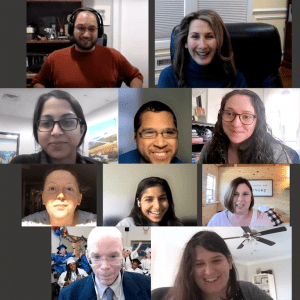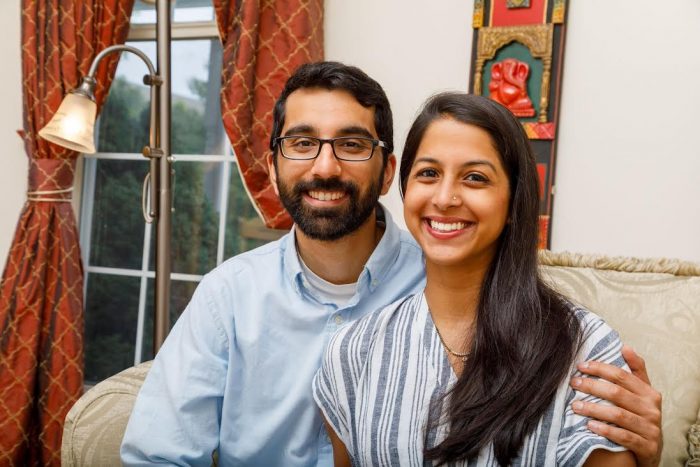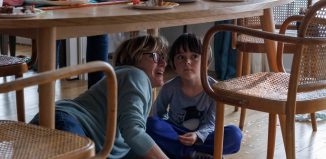A year later, Stony Brook University LEND trainees reflect on lessons learned
By Daniel Dunaief
Bringing together people from a range of experiences and perspectives, Stony Brook University is preparing to complete the first year of its LEND training program, which is designed to help provide support and services for people with autism and neurodevelopmental disabilities.
Over 100 trainees will complete the course this month, as the leaders of LEND, which stands for Leadership Education in Neurodevelopmental and other related Disabilities, prepare to educate a second year of participants that is expected to exceed 300 people.

2nd row: Pallavi Tatapudy, Isaac Rodriguez, Morgan McNair
3rd row: Sarah Grosser, Anjolie Nagarwalla, Jenny Andersson
Bottom row: Christopher Rosa, Ava Gurba
Matthew Lerner, LEND Center Co-Director, Research Director of the Autism Initiative, and Associate Professor of Psychology, Psychiatry & Pediatrics, and Michelle Ballan, LEND Program and Center Director, Professor, and Associate Dean for Research in the School of Social Welfare and Professor of Family, Population and Preventive Medicine, run the program, which is the first on Long Island to receive a federal grant that supports training students, families, professionals and self-advocates.
Lerner described three key takeaways for the $2.2 million, five-year grant.
First, “if we want to be effective in supporting individuals with neurodevelopmental disorders we have to be interdisciplinary,” he said.
Second, the group, which includes trainees at three different levels depending on their time commitment to the program, needs to “listen to the voices of autistic people,” Lerner added. For too long, “they’ve been an afterthought at the table of care.”
Third, the work is a “process and not an outcome,” he said.
Many of the participants in the program appreciated the opportunity to engage in an interdisciplinary effort.
Self-advocate
Ava Gurba, a self-advocate and master’s student at Stony Brook University who has autism and cerebral palsy, said she saw LEND as her chance to “reframe the professional discipline” and inform people in a range of fields about what life is “really like” for her and others.
Many professionals in health care have limited experience working with self-advocates.
“They have only interacted with disabled people as clients in a therapeutic setting or as research subjects,” Gurba said.
Researchers and service providers don’t often know how to incorporate the lived experience for the family and from self- advocates, she added.
Gurba suggested that some professionals need to “unlearn” practices that don’t incorporate the values and needs of people with disabilities.
The medical community is often looking for cures, while Gurba said she and others with disabilities are more often looking for ways to be integrated into the community, through social, employment, or educational opportunities.
Clinical training
For Alan Gerber, a doctoral student in the Department of Psychology at Stony Brook, LEND provided autism-specific clinical training, including planning treatment and reviewing the progress for specific patients.
“It gives me an opportunity to get together with an inter-disciplinary cohort and see things from a different lens,” Gerber said.
Gerber plans to be a clinical researcher and will conduct post doctoral research at the Yale Child Study Center.
LEND “made me think very deeply about what is clinically meaningful research,” Gerber said. When he speaks with families, pediatricians and social workers, he wants to do the kind of research that is “really going to change a family’s life.”
Gerber hopes to remain in contact with other members of the LEND community, where he felt he was part of a team.
Paradigm shift
As a high school bilingual speech language pathologist who works closely with individualized education plans, Jenn Solomon wanted to understand more about the lives and challenges of people with developmental disabilities.
LEND provided a paradigm shift for Solomon in helping her understand disability. “I can listen to what people with disabilities have to say, and I can reflect and learn,” Solomon said.
One of Solomon’s broader goals is to advocate on behalf of students who have obstacles to overcome.
Jenny Andersson, who works for the New York State Department of Education Office of Special Education funded project called the Educational Partnership, suggested that LEND “exceeded what I had imagined.”
Like other trainees, Andersson, who is Director of the Early Childhood Family and Community Engagement Center, appreciated the participation of self-advocates.
“I approach everything in my work now and ask, ‘Did we invite all stakeholders to the discussion?’”
Ripple effects
Andersson is excited to see the ripple effect of the program, where other professionals benefit from what trainees learn and discuss and change their practices.
Indeed, Dr. Pallavi Tatapudy, a second-year psychiatry resident at Stony Brook, said her husband Nishank Mehta, who is a first-year orthopedic surgery resident at Stony Brook, has learned about advocacy from some of the discussions she had through LEND.
“This experience of working together and hearing all of these personal insights, you cannot get from a textbook,” Tatapudy said.
Tatapudy understands the value of consulting with people who have disabilities and with their families. “The patient is the expert,” she said.
When she worked in the inpatient psychiatric unit on the 12th floor of Stony Brook Hospital, Tatapudy said she spoke to a family who was admitting a child with a neurodevelopmental disability. She asked parents for an idea of ways to comfort their child that de-escalate emotionally charged moments at home. His parents said a particular blanket from home provided comfort, which they brought to the hospital.
Tatapudy is “proud” that Stony Brook is a LEND center, joining 60 others throughout the country.
For Lerner, who was a LEND trainee about a dozen years ago and continues to stay in touch with his LEND cohort, the effort helps experts learn from each other and from self-advocates who can share their perspectives. “None of us has enough expertise to do this alone,” he said.







